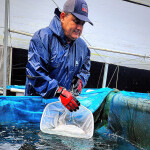The National Oceanic and Atmospheric Administration last week released a draft policy encouraging the use of catch share fishery management systems. The agency said it recognizes that while such systems are not the cure-all for ailing fisheries they are a proven way to promote sustainable fisheries when adequately designed.
The mainstream media outlets from Maine to Texas to Alaska were quick to pick up on — and editorialize — the controversial subject.
The Boston Globe threw its support behind catch shares, saying “the chance that the nation’s depleted ocean fish will return to healthy levels rose considerably Thursday when the federal government put its support behind a new way of managing fisheries.”
Though many media outlets failed to delve into the other side of the story, some did, pointing out that many fishing organizations have major concerns about catch shares.
The Gloucester Times ran a news story that included comments in favor of catch shares from NOAA Administrator Jane Lubchenco, the Pew Environment Group and Environmental Defense Fund. A few days later, the Massachusetts paper ran an editorial giving the opposition’s view a voice. “Our federal government is perfectly willing to pursue a policy bend on driving independent fishing boats — each a small business in its own right — right out of the industry, right out of the fishermen’s and their families’ traditional way of life. That’s absolutely unacceptable — and a move our lawmakers have to stop.”
As Thursday’s announcement settled in, more news outlets went the way of the Gloucester Times and painted a complete picture of the story. The Houston Chronicle called catch shares a “controversial concept.” The Texas newspaper cited Gov. Rick Perry as a critic, saying the system turns fishing into a property right that gives commercial interests an edge over recreational anglers, pointing out that it has a potentially negative impact on the economy.
The New York Times published a news story that included statements from both advocates and naysayers. The paper noted that environmental groups as well as commercial and recreational fishing groups co-authored a letter to Congress in support of catch shares. It also quoted groups, including Pew and Food & Water Watch, that question the socioeconomic effects of catch shares, especially for small-scale fishing operations.
“The chief concern for the fishing and environmental groups that question the plan is over how the programs are set up. The ability to buy and sell shares of fish has the potential to create a system that favors large corporations or cedes parts of the catch to outside interests,” said the New York Times, while providing examples of catch share program success and failures.
Perhaps the most balanced account of the catch share debate came from the Portland Press Herald. The Maine paper ran two editorials on the subject: Fisherman Mary Beth de Poutiloff and F&WW field organizer Nathalie Graham co-authored the editorial “If ‘catch shares’ catch on, many independent fishermen will be swallowed up.”
“Entire fishing communities in Maine and throughout the country could be destroyed” by catch shares, said the pair. “Can we really let our most valuable natural resource and our nation’s oldest industry, which have created vibrant coastal communities throughout the 88,000 miles of U.S. coastline, become another Wall Street property?”
A week later, the paper’s editorial staff penned that while a catch share system isn’t perfect, it is better. “Adopting a more logical, coherent and fair system of allocating catch shares will improve the ability of those who remain to make a go of it until stocks improve — a process that is already occurring with some species. The old days of groundfishing in Maine will never be back. But the new day that is coming can still see a healthy industry in place, if wisdom and not nostalgia is allowed to prevail.”





